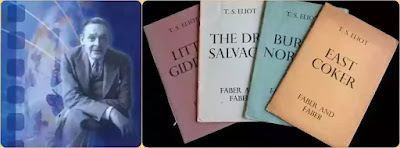Also Read
Introduction: In Western classical music, a quartet is a piece written to be played by four stringed instruments. It is divided into five sections called movements, linked by recurring themes which are developed in a complex way and then resolved. In The Four Quartets, one may find the musical analogy quite well-paralleled. Each is divided into five movements of varying tempo, there is a variety of modes of speech corresponding to the combination of various musical instruments, and there is the complex development of themes.
The theme common to all the four poems is religion. It is concerned with search for meaning in the chaos of the "twittering world" for peace and joy in the flux of time, and the discovery of God in permanence. Eliot's central theme is the effort seeking to adjust the "delicate relation of the Eternal to the Transient".
Summary:
The First Section: Burnt Norton, is an illustration of the use of religious and metaphysical concepts in poetry. The general theme of attaining a sense of lasting values amidst the flux of time. reaching a consciousness of the 'eternal' that is free of possible disillusionment from trusting appearances and self-deception. The main theme is stated in the first section - the passage of time seems futile and meaningless unless of one senses moments of experience that seem 'timeless' because of their value and intensity. Only then the past and the future fuse into the present, and the sense of time, with its hold on the spirit, seems to dissolve. The visitor Burnt Norton (the name of a large country house in England) was apparently the occasion of an experience of spiritual illumination for the poet. The theme is presented, not straight forwardly, but through concepts, and the crystallization of the experience comes through paradoxes and negatives. Thought is expressed through images place daylight, darkness. The section ends with the restated possibility of finding timeless moments and their significance.
The Second Section: East Coker, is again associated with a place - a Somerset village from where Eliot's ancestors went to America. "In my end is my beginning" - the sentence that Mary Queen of Scots embroidered while waiting for her death in prison is the key to this section. Time in this section is not the abstract progression of past, present and future, but the more immediate sequence of birth, maturity, decay and death. If the dominant element in the imagery of Burnt Norton was air (disturbing dust, echoes, vibrant air, music), in this section the dominant element is earth. Furthermore, this section is marked for being personal rather than philosophical, particular rather than general. The major theme develops life should be "burning in every moment" and not merely a memory of isolated moments of intensity. We should constantly possess the sense of the eternal - that the beginning and the end are co-present with one another, otherwise there will appear only chaos and no scale of values. The way towards experiencing the eternal is painful, passing through "darkness of God". Even to express the struggle in poetry is difficult, as the techniques available are inadequate. But the individual does have the possibility of spiritual discipline and rebirth.
The Third Section: Dry Salvages, takes its name from a small group of rocks off the north-east coast of Cape Ann, Massachusetts. The sea-scape is contrasted with the river scene and the water images convey certain aspects of human existence in time. Water is the symbol of birth, the river of life is uncontrollable, and the unlimitable sea of all life drowns the individual. Dry Salvages gives a harsher picture of the human condition than the earlier 'quarters'. But it also gives an unequivocal expression of depending on divine grace. Even the bell on the buoy seems to constitute menace as it measure a time older than the time of watches. One is lost unless one gains a sense of order, a sense of eternity. This can be gained through a belief in the Incarnation, depending upon divine grace.
The Fourth Section: Little Gidding, takes its name from a small country church to which Nicholas Ferrar, a devout Christian of the seventeenth century retired for a life of religious meditation and devotion based on the family. The theme indicated in the earlier sections are here woven together to lead to some thing beyond them - to a renewed confidence and spiritual exaltation. All the four elements of air, earth, water and fire are present in this section, but the dominant one is fire. All that is composed of these elements dissolve and die, and this death must be accepted. At the same time, one must be conscious of the eternal in time. Only when one has achieved this state of acceptance and detachment of serene simplicity, has one experienced the fire of purgatory - the purifying fire and seen the Rose of Redemption in Paradise.
Critical Appreciation and Analysis
Four Quartets is a landmark in twentieth century English poetry. It derives its them, symbolism, and resolution from religion. But the poem has been admired for its universality which goes beyond any rigid religion. In this work Eliot has achieved consummate artistic beauty. The poem is expression not only of a spiritual quest, but also the quest for a "proper modern colloquial idiom" and technique of poetry. There is a thematic unity between the four section. Recurring references to places associated with the poet's personal past, as well as contemporary events, recurring allusions and images and ideas - such as dancing, stillness, birds, music and journey - contribute to making the sections a coherent poetic statement. Nor can one overlook another basic them running through all the sections - that of the difficulty of giving artistic expression to profound religious apprehensions. Eliot has developed an original mode of poetry and shows the technical possibilities that English poetry is capable of Four Quartets shows a quieter and greater technical assurance than The Waste Land.
